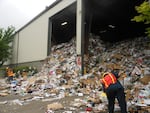
At least 2.5 percent of the material collected from curbside recycling bins will end up going to a landfill after it leaves the Far West Fibers recycling facility.
Amanda Troxler / OPB
Apparently, we haven’t been doing a very good job of sorting our trash from our recycling — and the Chinese government has noticed.
China doesn't want loads of our paper and plastic waste that often have contaminants like dirty diapers inside.
So, the government is cracking down on the shipment of recyclable material from the U.S. By the end of the year, much of the mixed plastic and paper in our recycling bins will be banned from China.
That leaves companies in the Northwest without buyers for much of the material they collect from curbside bins, which could mean our recyclables will end up in a landfill.
Peter Spendelow, natural resource specialist with the Oregon Department of Environmental Quality, said the loss of Chinese buyers is a major disruption in the recycling market. It's unclear where all the paper and plastic will go instead.
“We’ve seen markets go up and down before, but this is big," he said. "When the major buyer cuts out with almost no notice – it's going to be a struggle for a while. There's just no way around it."
Recycling companies have warned regulators that they may need permission to trash recyclables while they look for new buyers.
Some, including Far West Recycling in Portland, are slowing down their operations to more carefully remove garbage to meet China's new standards for contamination.
Far West outreach manager Vinod Singh said he's most concerned about where his company is going to send all of its mixed paper – things like junk mail, catalogs, small cardboard boxes and packaging – which will only increase with the holiday season approaching.
"China is by far the biggest consumer of mixed paper," he said. "They're the global consumer."
There's already fewer buyers because China is still in the process of reissuing licenses to recycling companies. Meanwhile, prices for recyclable materials are dropping. So, while Far West is spending more to sort trash from recyclables it's also making less on the materials it's selling.
"People are starting to get nervous that we’re putting things on order that won’t get there before the ban kicks in," he said.
Spendelow said Northwest recyclers used to sell mixed paper to local paper mills, but two of those mills in Oregon have closed in recent years and one in Longview stopped taking mixed paper.
Spendelow and Singh both agreed that people who are putting materials in their recycling bins can help the cause by making sure they only put the approved recyclable items in their curbside bins.
“The public can’t help much for finding markets for these materials,” Spendelow said. “But this is a good time to really think about what you’re putting in your bin and make sure you’re not putting in things that don’t belong there.”
Things like garden hoses, plastic bags and Christmas tree light strings don’t belong in the curbside recycling bin and cause major problems at the sorting facility.
“They get wrapped around the screens and they clog up the machinery,” he said. “They just slow up the process and send your things on the long road to the landfill instead of the short road.”

